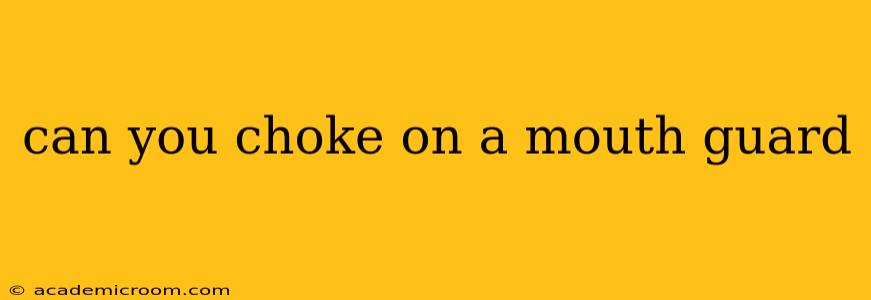Can You Choke on a Mouthguard? Understanding the Risks and Prevention
The short answer is: yes, it's possible to choke on a mouthguard, although it's relatively rare. While designed to protect your teeth, improper use or certain types of mouthguards can create a choking hazard, particularly for young children or individuals with specific medical conditions. Let's delve into the specifics.
What are the risks of choking on a mouthguard?
The primary risk associated with choking on a mouthguard stems from its size and shape. A poorly fitting mouthguard, one that's too large or incorrectly positioned, can obstruct the airway. This is especially true if the mouthguard is dislodged during strenuous activity and becomes lodged in the throat. Furthermore, certain types of mouthguards, particularly those made of soft materials, can be more easily deformed or compressed, increasing the risk of airway blockage.
What types of mouthguards pose a higher choking risk?
While all mouthguards carry a potential risk, some pose a greater threat than others:
- Poorly fitting mouthguards: Mouthguards that are too large or too small are significantly more likely to cause problems. A too-large guard might slip and obstruct the airway, while a too-small one could become dislodged and ingested.
- Soft mouthguards: These offer more comfort but can more easily deform, making them potentially more dangerous if they obstruct the airway. Their flexibility also means they can be more easily swallowed.
- Mouthguards with small parts: Some mouthguards have small components, such as straps or attachments, that could become detached and cause choking.
How can I prevent choking on a mouthguard?
Preventing choking incidents requires careful selection and use of mouthguards:
- Proper fit is paramount: Ensure your mouthguard fits correctly. It should be comfortable and snug but not restrictive. Get professionally fitted mouthguards, especially for children, to minimize the chance of an ill-fitting device.
- Choose the right type: Consider the activity level and your individual needs. Hard mouthguards may be preferable for high-impact sports due to their sturdiness and reduced risk of deformation.
- Proper supervision, especially for children: Young children should always be supervised while wearing a mouthguard, particularly during activities that could cause it to become dislodged.
- Regular inspection: Regularly check your mouthguard for any damage or wear and tear. Replace damaged mouthguards immediately.
- Teach proper removal: Teach children and others how to safely remove their mouthguard without causing it to become lodged in their airway.
Are there specific medical conditions that increase the choking risk?
Individuals with conditions affecting swallowing, breathing, or neuromuscular control might face a higher risk of choking incidents related to mouthguards. This includes children with certain developmental delays or adults with neurological conditions. Consult a physician or dentist before using mouthguards if you or your child have such concerns.
What should I do if someone is choking on a mouthguard?
If someone is choking on a mouthguard, immediately administer the Heimlich maneuver. If you are not trained in the Heimlich, call emergency services immediately. Time is critical in such situations.
By understanding the risks and following preventative measures, you can significantly reduce the chance of choking on a mouthguard. Remember, a properly fitting and appropriately used mouthguard provides crucial protection, but safety and awareness remain essential.
